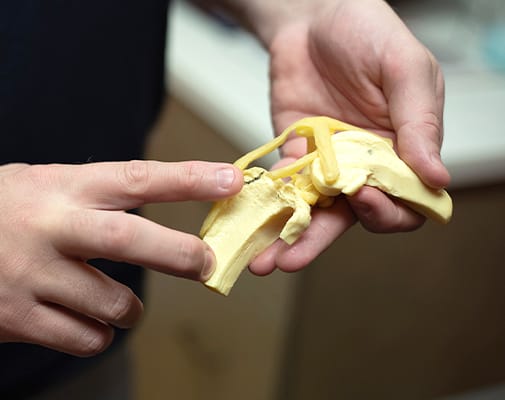There is a wide range of orthopedic conditions that affect cats and dogs. At Providence South Animal Hospital in Waxhaw, our experienced veterinarians can help treat these conditions with surgery.
What is orthopedic surgery?
Orthopedic surgery for pets consists of surgical procedures that address the joints, skeletal system and their associated soft tissues, including muscles, cartilage, tendons, and ligaments.
Our advanced diagnostic imaging tools help us provide accurate and effective orthopedic diagnosis.
How can I tell if my pet needs orthopedic surgery?
There are many reasons why your pet may require orthopedic surgery. Conditions ranging from kneecap dislocation issues and complex bone fractures to hip dysplasia and cruciate ligament tears can be treated with orthopedic surgery.
While symptoms of these conditions vary, some of the most common signs include; obvious pain, pronounced limping, reluctance to walk or bear weight on leg, decreased range of motion, sitting abnormally, swelling around knee and licking or biting a knee.
If your pet is showing any of the symptoms listed above it is important to book an appointment with your vet. Orthopedic conditions are painful and typically do not clear-up on their own. Left untreated many of these conditions will become increasingly severe.
What is involved in orthopedic surgery?
You will begin by bringing your pet in for a consultation with the veterinary surgeon. During this appointment we will complete a physical exam, review your pet’s medical history, and do a number of diagnostic tests to determine the nature of your pet's condition. Once your vet has the test results, we will create a surgery plan, discuss the recommended treatment it with you, and book your pet's surgery time.
Your vet will provide you with a list of pre-surgery instructions for your pet. This will include restricting food and water on the day before the surgery. It is essential that you follow your vet's instructions carefully. Depending on the time of day that your pet's surgery is scheduled, you may need to drop your animal off the night before.
Veterinary orthopedic surgeries in Waxhaw typically last from 2 - 4 hours depending on the surgery being performed. Once the surgery is complete, your vet will contact you to let you know how the procedure went.
While some patients may be well enough to head home on the day after their surgery, many of our patients need to stay with us for a number of days so that we can monitor their recovery.
What special care or treatments will my pet need after orthopedic surgery?
Following orthopedic surgery your vet will prescribe any medications required for pain management or to fight infection, and will provide you with post-surgery instructions on how and when to administer the medications as well as how to care for your pet post-surgery.
After surgery you will need to restrict your pet's activities for a period of time, and in some cases crate-rest will be recommended.
Other post-surgery instructions may include how to care for your pet's incision site, and how to spot signs of infection.
A followup appointment will be scheduled for your pet. This appointment allows your team of veterinary professionals to monitor your pet's recovery progress, change bandages if required, remove stitches if required, and check for early signs of any problems.
Canine Physical Rehabilitation (physiotherapy for pets) may be recommended, to help your pet recover, and rebuild their strength, range of motion, flexibility and muscle endurance.
Following your vet's instructions for post-surgery care will help your pet to recover as quickly as possible and go on to enjoy a more comfortable and happy life.

Tibial Tuberosity Advancement
Tibial Tuberosity Advancement (TTA) is a surgical procedure that can help some dogs with knee pain regain better mobility and reduce pain.
It involves cutting the top of the shin bone, moving it forward, and stabilizing it in its new position. The goal of TTA surgery is to make the knee stable for the dog when bearing weight, without directly repairing the ligament.
Disc Repair
Just like humans, dogs can develop disc problems in their neck and backs. Breeds that commonly suffer from neck disc problems are Cocker Spaniels, Poodles, Dachshunds and Lhasa Apsos, whereas large breed dogs are more likely to have chronic lower back issues.
Dogs with advanced disc disease should have surgery as soon as possible. The sooner that surgery is done, the better the prognosis.
Hip Replacement
Hip dysplasia is the medical term for a hip socket that doesn't fully cover the ball portion of the upper thighbone. This allows the hip joint to become partially or completely dislocated. It is most common in large breed dogs like German Shepherd Dogs and Golden Retrievers.
Total hip replacement is the most effective surgical treatment for hip dysplasia in dogs. The surgeon replaces the entire joint with metal and plastic implants, returning hip function to a more normal range.
Torn Ligament Repair
Torn cruciate ligaments in dogs, just like in people, must be surgically repaired to prevent arthritis. There are many different types of surgical procedures that can be used to repair this injury, and the type used typically depends on the size of the dog.
Cranial Cruciate Ligament (CCL) surgery for dogs may include a variety of techniques that aim to provide stability to the joint.
